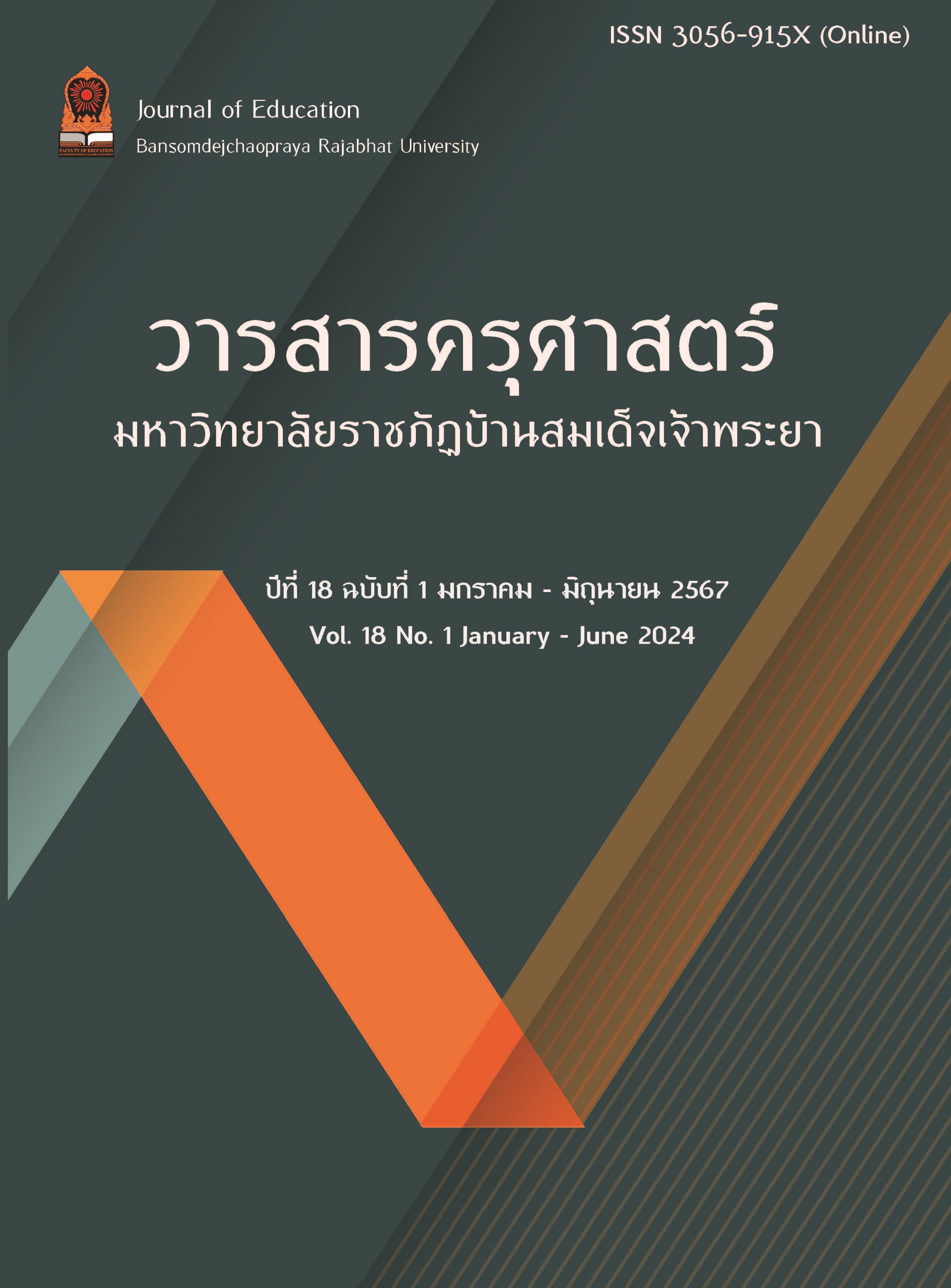Develop educational achievement in the art and music subject groups. A story about Orff's teaching ideas. For 4 th grade students at Wat Pong School
Keywords:
Orf's teaching concept, academic achievement on rhythm, Wat Pong SchoolAbstract
Research on the development of academic achievement Art and music learning group: Rhythm according to Orff's teaching concept for 4th grade students at Wat Pong School The objectives are: 1) to compare academic achievement 2) to study learning progress 3) to study satisfaction. The sample groups used in the research are: Grade 4 students at Wat Pong School, Semester 2, Academic Year 2023, 1 classroom, which was obtained from simple random sampling, with a total of 40 students. Tools used in the research: 1) Content of music learning activities on rhythm according to Orff's teaching concept 2) Lesson plan 3) Test to measure learning outcomes before and after learning the reliability value is 0.96. and 4) Measurement form Satisfaction for Grade 4 students with learning about the arts subject group the consistency index value is equal to 1.00. Statistics used in the research include: 1) percentage 2) mean; 3) standard deviation and 4) class normalized gain
The research results found that
1) Academic achievement It was found that students had an overall average score of 25.70 ( = 25.70).
2) Academic progress. It was found that the learning progress value was 0.80 (<g> = 0.80).
3) Academic satisfaction According to Orff's teaching concept For Grade 4 students at Wat Pong School ( = 4.33, S.D. = 0.67)
Downloads
References
กระทรวงศึกษาธิการ. (2551). หลกัสูตรการศึกษาขั้นพื้นฐาน พุทธศักราช 2551.กรุงเทพมหานคร:โรงพิมพ์ชุมนุมสหกรณ์การเกษรแห่งประเทศไทย.
กานต์นนท์ จุลกาญจ์นนท์. (2565). การพัฒนาผลสัมฤทธิ์ทางการเรียน เรื่อง การอ่านโน้ตดนตรีสากล ตามแนวคิดการสอนของโคดาย นักเรียนชั้นประถมศึกษาปีที่ 3. (วิทยานิพนธ์ปริญญามหาบัณฑิต).กรุงเทพฯ: มหาวิทยาลัยกรุงเทพธนบุรี.
พิทิต แสนอินทร์.(2564).การพัฒนาชุดกิจกรรมดนตรี สำหรับนักศึกษารายวิชาการสอนดนตรีตามแนวทางของออร์ฟ วิทยาลัยการดนตรี มหาวิทยาลัยราชภัฏบ้านสมเด็จเจ้าพระยา.วารสารดนตรีบ้านสมเด็จฯ, 3(2), 39.
โรงเรียนวัดโป่ง. (2563). เอกสารงานวิชาการด้านคะแนนวัดผลโรงเรียนวัดโป่ง 2563. ชลบุรี :โรงเรียนวัดโป่ง.
วาสนา สาระจันทร์. (2561). การจัดการเรียนรู้วิชาดนตรี ตามแนวคิดของคาร์ลออร์ฟร่วมกับกระบวนการแก้ปัญหา เพื่อพัฒนาทักษะการปฏิบัติทางดนตรีและทักษะความคิดริเริ่มสร้างสรรค์และนวัตกรรมสำหรับนักเรียนชั้นมัธยมศึกษาตอนปลาย. (วิทยานิพนธ์). กรุงเทพฯ: จุฬาลงกรณ์มหาวิทยาลัย.
วิทยา ไล้ทอง. (2561). การคลอทํานองเพลงด้วยโดรนตามแนวคิดในการสอนดนตรีของออร์ฟ. วารสารครุศาสตร์จุฬาลงกรณ์มหาวิทยาลัย, 46(4), 355.
สำนักงานเลขาธิการสภาการศึกษา กระทรวงศึกษาธิการ. (2565). รายงานการศึกษาไทย พ.ศ.2565. กรุงเทพฯ: บริษัทพริกหวานกราฟฟิค จำกัด.
อัมทิภา ศิลปพิบูลย์, นัทธี เชียงชะนา, และนิอร เตรัตนชัย. (2563). กลวิธีการสอนดนตรีในชั้นเรียนรวมระดับประถมศึกษา:มุมมองจากประสบการณ์ของครูสอนดนตรี. วารสารวิทยาลัยราชสุดา, 17(2), 18.
Warner, B. (1991). Orff. Schulwerk Application for the Classroom. NJ: A Person Education.
Kuder. (1993). การหาความเชื่อมั่นโดยใช้วิธีการของคูเดอร์ ริชาร์ดสัน (Kuder - Richardson Method). สืบค้นจาก http://www.wijai48.com/leriability/ richardson.htm
Likert, Rensis. (1932). "A Technique for the Measurement of Attitudes". Archives of Psychology, 140, 1-55.
Downloads
Published
How to Cite
Issue
Section
License
Copyright (c) 2024 Faculty of Educaion Bansomdejchaopraya Rajabhat University

This work is licensed under a Creative Commons Attribution-NonCommercial-NoDerivatives 4.0 International License.
บทความที่ได้รับการตีพิมพ์เป็นลิขสิทธิ์ของคณะครุศาสตร์ มหาวิทยาลัยราชภัฏบ้านสมเด็จเจ้าพระยา
ข้อความที่ปรากฏในบทความแต่ละเรื่องในวารสารวิชาการเล่มนี้เป็นความคิดเห็นส่วนตัวของผู้เขียนแต่ละท่านไม่เกี่ยวข้องกับมหาวิทยาลัยราชภัฏบ้านสมเด็จเจ้าพระยา และคณาจารย์ท่านอื่นๆในมหาวิทยาลัยฯ แต่อย่างใด ความรับผิดชอบองค์ประกอบทั้งหมดของบทความแต่ละเรื่องเป็นของผู้เขียนแต่ละท่าน หากมีความผิดพลาดใดๆ ผู้เขียนแต่ละท่านจะรับผิดชอบบทความของตนเอง



